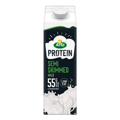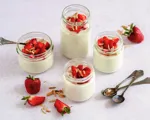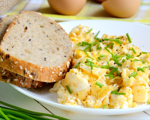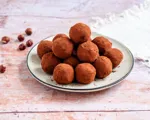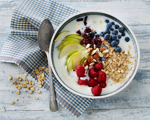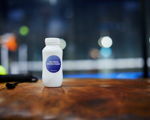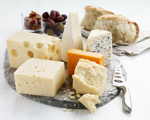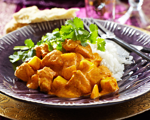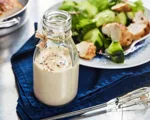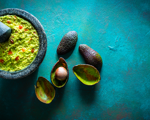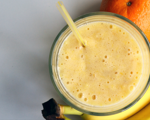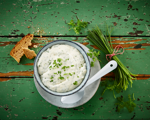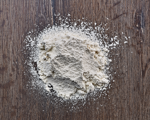
The amount of protein in milk varies greatly depending on the type. There are many different milk and milk drinks on the market, but in this article, we try to outline some general information about some of them. Hopefully, this will give you an overview of the amount of protein in milk.
You might also want to read about high-protein foods and protein in common foods.
Protein in cow's milk
Cow’s milk consists of two types of protein: casein and whey. Casein protein makes up about 80 % of the total protein content, whereas whey protein comprises the remaining 20 %. The protein in cow’s milk is a complete protein. The exact amount of protein in cow’s milk varies according to the type, so in the following, you can read about whole milk, semi-skimmed, and skimmed milk and their respective protein content.
Whole milk
Whole milk contains about 3.4 grams of protein per 100 grams, and the energy contribution is 21.8 % of the total energy value.
Whole milk is a type of milk that is essentially unaltered, meaning that none of its components have been removed. It has a rich, creamy texture and a full-bodied flavour. It is a favourite for the morning coffee and breakfast cereal.
Semi-skimmed milk
Despite having a reduced fat content compared to whole milk, the protein content in semi-skimmed milk is almost the same, offering around 3.4 grams per 100 grams. Of the total energy value, protein makes up 29 %.
For those who prefer a middle-ground approach to their milk consumption, semi-skimmed milk is a good choice. It is a halfway point between whole and skimmed milk. It can lighten up your coffee without losing all the creaminess.
Skimmed milk
Skimmed milk contains 3.5 grams of protein per 100 grams, and protein constitutes about 40.5 % of the total energy value, which is higher than the two types above.
Skimmed milk is the lightest of the bunch. With most of the fat removed, it has a thinner taste and texture. It is perfect if you do not want to change the consistency of your coffee.
Protein in goat milk
The protein content in goat milk is 3.6 grams per 100 grams and 21.2 % of the total energy value.
Like most animal milk, goat milk has a ratio of casein and whey of about 80 % and 20 %, respectively. The taste of it is a bit stronger than cow's milk, often described as sweet.
Protein in plant-based drink
Plant-based drink, such as almond, soy, or oat, does not naturally contain whey or casein proteins, as these proteins are specific to milk. Instead, they contain different types of plant proteins, and the amounts can vary widely depending on the source and processing methods.
Soy drink
Soy drink contains about 3.2 grams of protein per 100 grams, and the energy contribution from protein is 29 % of the total energy value. This is similar to the values of cow’s milk, but keep in mind that the other components of the two types differ.
Soy drink is made from soybeans, which are soaked, ground, and strained. As a result, it has a creamy, slightly sweet flavour that is perfect for your coffee or morning smoothie. Read more about soy protein.
Almond drink
Almond drink usually contains about 0.9 grams of protein per 100 grams, equalling 7.8 % of the total energy value. It is a creamy, nutty alternative to traditional dairy and soy drinks, but as you can see, the protein content is somewhat lower.
Almond drink is made by blending almonds with water and then straining out the solids. This leaves a smooth, creamy liquid with a subtle nutty flavour that is excellent for cereal and oatmeal.
Oat drink
Oat drink contains about 0.6 grams of protein per 100 grams, and protein makes up around 5.1 % of the total energy value.
Oat drink has a creamy texture and slightly sweet flavour, which has made it a favourite among plant-based varieties. It is made by soaking oats in water, blending them, and then straining out the solids. It goes particularly well in coffee and tea, adding subtle sweetness without overwhelming the flavour.
Pea drink
The protein content in pea drink is about 2 grams of protein per 100 grams, and protein makes up between 19 and 24 % of the total energy value, depending on the specific product.
Pea drink may not be as well-known as some of the other plant-based types, but it still deserves a spot on the list. Despite what the name might suggest, it does not taste like peas. It is made from yellow peas, which are ground into flour, mixed with water, and then separated from the solids.
This results in a neutral-tasting beverage that works in savoury dishes, cereal, coffee, or just poured in a glass to enjoy. Check our article about pea protein to learn more.
Coconut drink
Coconut drink contains 0.3 grams per 100 grams, which equals 4.9 % of the total energy value. It does not make it among the top scorers on our list, but that does not mean that you cannot enjoy it and include it in a balanced diet.
Coconut drink is loved for its tropical flair and creamy texture. It is made by grating the flesh of mature coconuts, soaking it in hot water, and then straining it. This creates a rich, creamy liquid with a distinct tropical taste that makes it ideal for smoothies, desserts, or any dish where you want to add a bit of a tropical twist.
Which milk has the most protein?
As you can see from the values above, cow’s milk contains the most protein – about 3.5 grams per 100 grams and a differing percentage of the total energy value depending on whether it is whole, semi-skimmed, or skimmed milk. Close to cow’s milk is goat milk, so the two animal-based milk types contain the most protein.
As for the plant-based drinks, soy milk is the one that gets closest to the animal-based ones.
Related Articles
Looking to learn about protein content in different foods? Explore our comprehensive guides:

